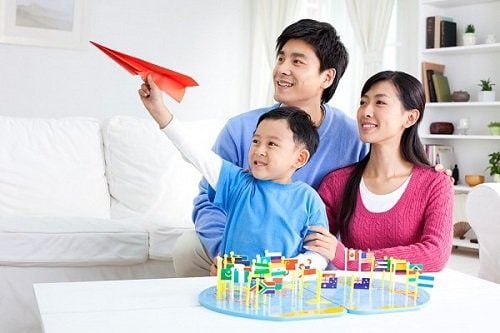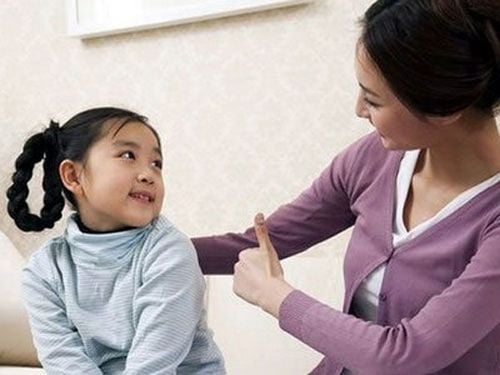This is an automatically translated article.
Making the decision to divorce is not easy, but telling your child that your parents are getting divorced is also not easy. How to tell your child that you are getting a divorce?1. What preschoolers need to know about divorce
Preschoolers may not have heard the word divorce, and many won't know what it means. Isolina Ricci, a psychotherapist who wrote the book "Mom's House, Dad's House for Kids," says 2-year-olds have specific thoughts and may not see how much different their home life is when their fathers do. divorced mother.But an older child might worry about how things might change: where he'll live, where he'll sleep, and whether he'll continue to see both mom and dad.
With preschoolers, you need to keep things simple and clear. So let's explain things in the simplest terms: Mom or Dad will no longer live at home and the child will spend some time both in the old home and in the new home with either parent. The most important message children receive is that they will be cared for and loved, no matter what.
Even the friendliest separation can make a terrifying change for a child. In the book Why Did You Have to Get a Divorce and When Can I Get a Hamster? Psychologist Anthony Wolf writes, “Nor does preschoolers like it, because both are scary.” Don't be surprised if your preschooler shows signs of insecurity or withdrawal, has nightmares, is fussy, or looks a lot. attention from you and others during this difficult time This is normal.Children need time to re-establish confidence in their world.
However, even the youngest children can also be amazingly resilient and adaptable.The way you talk about divorce before, during, and after it happens makes a big difference in how your child reacts to it. The best thing about you right now is the peace of mind and consistency in the routine your child relies on.

Trẻ mẫu giáo có thể chưa từng nghe từ ly hôn, và nhiều trẻ sẽ không biết nó có nghĩa là gì
2. How do you tell your children about the divorce?
2.1. Speak at the right time
If you and your spouse are considering separation or divorce, keep it private until you know for sure what to expect. While full disclosure may seem better, uncertain words like "Mom and Dad are thinking about a divorce" will unnecessarily confuse preschoolers.Remember that 1 week is a long time for preschoolers. It's best to give your child only a few days' notice so they don't feel left out and confused for weeks.
While there can never be a "good" time to talk about divorce, there are bad times that you need to avoid:
When in daycare or kindergarten Right before you go to work When Children go out Or right before bed Then, when they suddenly feel very unsafe and very lonely, they will need you there. Pick a time when you have time to give your baby lots of hugs and reassurance.
2.2. Both mom and dad talk to their kids about divorce
You and your spouse should talk to your children about the divorce together. Even if you don't agree on everything else, try to agree on things to say to your child, for her sake. Ideally, you should share the news together. This avoids confusion and says it's a joint decision by both of you.According to Paul Coleman, psychologist and author of How to Say It to Your Kids, there's also an even more important reason to do this: It helps maintain a child's sense of trust in both parents. and mom.
2.3. Talk about divorce in a simple way
Use terms that you know preschoolers understand, limiting explanations to no more than a few key sentences. You can simply say that Dad is getting a new place to live and he's going to bring Mom over and take a look at it. Explain that the child will continue to see both parents. If your child has witnessed a lot of arguments, acknowledge that fact and explain that you are trying to do what's best for the family.It is important to emphasize to the child that the divorce is not the child's fault. Because kids can blame themselves for the breakup, even if they don't say so.
Young children think in simple terms, like “Because I didn't clean my room and that's why we argued”. You need to tell your child frankly that separation or divorce is an adult decision and not the child's fault.
2.4. Avoid blaming each other
No matter how angry you are, don't blame your partner for the breakup and avoid arguing in front of your kids. Also keep to yourself any details about extramarital relationships or financial problems. It will only confuse and upset the child.Don't make your dining table the focal point. Do not discuss legal matters, even on the phone, when your child can hear you. You may think these things will go through your child's head, but he can remember them.
And you need to try not to let anger or aggression creep into your voice. If there is a guardianship assessment, minimize the impact by not being too elaborate or training the child on what to say.

Không đổ lỗi cho người bạn đời của mình về sự tan vỡ và tránh tranh cãi trước mặt trẻ
3. Answers to Common Kindergarten Questions About Divorce
3.1. Why?
The favorite question of all preschoolers is sure to come up. Don't go into too much detail and insist on "we". You need to avoid saying things like "Mom and Dad don't love each other anymore" because the child may think that you can "fall out of love" with the child.You can choose more appropriate expressions such as: “Dad and Mom and Dad don't get along very well and both get tired of arguing, I'll find a place for mom and dad to live.”
3.2. When will dad come home?
Preschoolers may not understand that this change is permanent and it can take a long time for things to return to normal. Make it clear that you won't be coming back, but reassure your child, who may be afraid of losing one or both of you, by saying things like, "Even though you and I don't live together, you will. will always be your child. Parents will always love and take care of you."3.3. I miss you mom/dad!
Even if you feel relieved that your marriage is over, your kids may not be. Unless your partner is abusive or you have a lot of arguments. Don't be heartbroken when your child says he misses you, and let him vent his sadness: "I know you miss me and I miss you too. Even though I don't see you much, I can talk to you every day. Dad doesn't. I've got my own special bed at your house and I'll see you weekly."Depending on your child's relationship with your ex-spouse's family, your child may also need reassuring answers to questions like "Will I still see grandma and grandpa? Can I go visit your uncle?"
The same goes for you, while visiting your parents, your preschooler will look forward to seeing you. Children may have mixed feelings when visiting their parents, you can reassure them by saying: When you are at my father's house, I miss you very much. You miss me too, don't you, it's okay if you miss your dad while you're with me."
3.4. Where will you sleep?
At this age, children can begin to question how their life will be affected: "Will you still go to daycare? Do you still go to my parents' birthday party? ",...These worries may sound trivial to you, but they are very real to your child, so be detailed with your child: "You will still be living with me here in the house. At my new house, you will have your own special bedroom when you visit me.”
3.5. Who will take care of the parents?
Children may be really worried about their parents moving out. Children may also ask, "Dad would be sad without us?".
Hãy tránh nói về cuộc ly hôn qua điện thoại với bạn bè hoặc để TV trở thành người trông coi trẻ
4. What to do after telling your child about the divorce?
Divorce is difficult to understand and accept for children. While your preschooler adjusts to new circumstances, he or she will still need a lot of your love and care. Avoid talking about the divorce over the phone with friends or letting the TV be the babysitter. Give them more time or add a story at night. Just as you benefit from the support network of family and friends more than ever, your child needs more hugs and kisses from you too.Continue talking to the child. Even after the divorce is in the past, be prepared to repeat the same explanations, for weeks or even months. If you want to know what your child is thinking, you have to spend time with him, let him talk. One way to keep the lines of communication open is to read books that help with this change process.
You also need to keep the routines consistent. The disruption of a divorce can make it difficult to maintain your usual routines or even keep your home organized. But you still have to carry on with your child's normal schedule, in mom's house and dad's house, giving him a sense of security.
Keep routines as much as possible, like mealtimes and other chores to be the same in both homes. Real feeding and keeping the house tidy will also help them get through the chaos that emerges in life.
Watch out for signs your child is having problems with your divorce. Preschoolers may have difficulty adjusting to moving between houses. Watch for misbehavior, especially after a visit with another parent. To start a conversation without your child saying anything, say something like, "I was wondering if I miss you now."
Children may just need time to move from dad's house to mom's to vent. Then you need to reassure the child "I understand that you are sad and angry" before hugging the child in a comforting way.
Don't make your child your spy. When a child returns home from a visit, resist the temptation to give yourself information about what the other person has done or said. No matter how curious you are, don't try to make your preschooler your spy.
You might consider seeing a therapist to guide you and your child through this difficult period of change.
Make a positive point remaining. If your divorce happens, you're having financial problems and your child can no longer have all the toys he or she wants or has expensive vacations, let your child know that you'll still do a lot. interesting things together.
Children are objects that need to be cared for and protected, not only emotionally, mentally but also in the developmental stage, children are very susceptible to respiratory problems, respiratory infections. , skin diseases and gastrointestinal infections...Parents need to pay special attention to caring for and providing adequate nutrition for children. The pediatric department at Vinmec International General Hospital is the address for receiving and examining diseases that infants and young children are susceptible to: viral fever, bacterial fever, otitis media, pneumonia in children With a system of facilities, modern medical equipment, sterile space, minimizing the impact as well as the risk of disease spread, Vinmec will bring satisfaction to customers. and is highly appreciated by industry experts with:
Gathering a team of leading pediatricians: Including leading experts with high professional qualifications (professors, associate professors, doctors, Master's degree), experienced, worked at major hospitals such as Bach Mai, 108.. The doctors are all well-trained, professional, conscientious, knowledgeable about young psychology. In addition to domestic pediatric specialists, the Department of Pediatrics also has the participation of foreign experts (Japan, Singapore, Australia, USA) who are always pioneers in applying the latest and most effective treatment regimens. . Comprehensive services: In the field of Pediatrics, Vinmec provides a series of continuous medical examination and treatment services from Newborn to Pediatric and Vaccine,... according to international standards to help parents take care of their baby's health from birth to childhood. Advanced techniques: Vinmec has successfully deployed many specialized techniques to make the treatment of difficult diseases in pediatrics more effective: neurosurgery - skull, stem cell transplant blood in cancer treatment. Professional care: In addition to understanding children's psychology, Vinmec also pays special attention to the children's play space, helping them to play comfortably and get used to the hospital's environment, cooperate in treatment, improve the efficiency of medical treatment.
Please dial HOTLINE for more information or register for an appointment HERE. Download MyVinmec app to make appointments faster and to manage your bookings easily.
Reference source: babycenter.com












